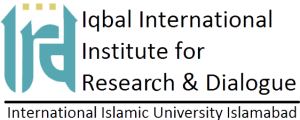GLOBALIZING LOKLORIC WISDOM: An International Conference on Folk Literature in Pakistani Languages
March 30- 31, 2022
International Islamic University Islamabad has successfully conducted it’s Day-2 academic sessions in collaboration with Iqbal International Institute for Research and Dialogue and Higher Education of Pakistan
The concurrent session-3, “Reconfiguring Folklore” was chaired by Dr. Arosa Kanwal. In the session, 3 presenters have presented their researches on different dimensions of folk literatures of Pakistan.
Breaking the ice, the first presenter, Dr. Zahoor Hussain a Ph.D scholar from BZU evaluated the folkloric wisdom in Saraiki poetry. His attempt showed that there exists a different scheme of features between American and European folktales, but the plot has been the same at a great extent. He further elaborated the Saraiki folk culture of a great significance where knowledge in #Saraiki traditions dating back to 14th century. He concluded that Saraiki folktales have wonderful aesthetic appeal with divine importance of human life.
The second presenter, Saud Hanif attempted a psychoanalytic study of Myths and Reality in conflict in Rajinder Singh Bedi’s and Sunderlal’s writing. He successfully examined the Hindu myths of Ramayana, contemporizing the archetypes in Sunderlal’s attempt explaining the patriarchal issues in contrast. The chastity of women he critiqued to concretized in Ramayana represented by Rajinder Singh.
Another researcher, Shoaib Mansoor showcased the folkloric elements in Abid Hussain’s poetry. He demonstrated Sufism and Romanticism in his poetry. Abid Hussain’s poetry to him had sarcastic sort of love, devotion and suffering as well. Shoaib Mansoor selectedly examined the folkloric cultures in Abid’s poetry. He considered Abid Hussain as a preacher and a social critic at the same time.
Soon after, the session-3, “Mapping Genres in Pakistani Folklores” started which was chaired by Mr. Muhammad Aslam Mir. Among the four researchers, Mr. Muhammad
Yousuf analyzed the proverbs and idioms in Rahman Baba’s poetry. He said Baba’s poetries caricature the common man’s wisdom and reasoning. Adding to it, he argued that #RahmanBaba is a man of great caliber, he uses wonderful poetic language filling with phrases and proverbs of the folk culture.
Abdul Basit, another researcher also showed evaluative study of #Pashto folktales. His research was based mainly on selected maxims and proverbs commonly used in folk culture of Pashtun. In this way, he encompassed the empathy and intellectuality of human characters. The proverbs and maxims in Pashto folk literature he added to have great knowledge. Wisdom for human beings in their common life are the essential features in Pashto folktales.
Lastly, Mr. Ilyas Bhatti’s research was on the status of women in Punjabi proverbs. He exemplified some proverbs in which he explored wit, beauty, humor and cultural norms. Mother was portrayed as the symbol of loyalty, chastity and devotion. The selected proverbs showed the highness of the role of women as mother, wife and sister. He contrasted the narrative in which women had been considered as deceiving, dishonest and unfaithful. In Punjabi folk literature, women have been highly appreciated and the role has always been credited.
The chair finally appreciated the presenters with certificates and also motivated them to dig out the folk cultures in the country.
